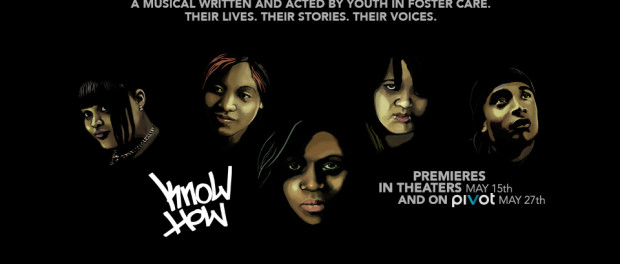Know How: Five Young Survivors Make a Film
Directed by Juan Carlos Pineiro Escoriaza, the docu-drama and musical Know How tells the inspiring stories of five foster survivors who didn’t think much of themselves until they realized what they had to offer the world and gain from life.
Know How strikes a sensitive chord the way movies like Precious or Dangerous Minds involving child abuse or rough teenage lives usually have. But, my emotional response turned out to be stronger than anticipated, since there is something beautifully genuine and special about the movie Know How.
Facing all kinds of outrageous and unfair struggles since they were born, five young individuals at the crossroads between adolescence, adulthood, and a stolen childhood that remains like a lump in their throats as well as in the back of their minds, try to be tough and survive in what often seems like a rotten world.
Megan shares a special bond with her younger sister Kayla, the only one around her to give meaning to the concepts of family and love. Eva, as an older sister to Desi, also playing the mother figure, has too much responsibility resting on her young shoulders while their dad is sinking into crack addiction. Austin is faced with the dilemma of either starving to death or acting against his own moral principles by joining his brother in engaging in gang activities and stealing.
https://www.youtube.com/watch?v=OizNbCyDf2o
The dynamic and bond between siblings who are fighting alone and yet together against all odds seemed like an interesting theme that I wish the filmmakers explored a little further. After all, family issues cut and run deep and these kids are the first to know. But then again, we could easily have made one distinctive film for each story. The idea with Know How was obviously to reinforce a message.
It is important to point out at the fact that we are not only discovering characters that have had a rough path here. Rather, we are meeting teenagers who weren’t trained as actors, but who actually have even more relevant experience that they share in common; they are either current or former foster kids. That implies that they each have real poignant personal stories which have shaped them as the strong individuals that they’ve become. Luckily for us, they’ve chosen to write them down and show us their perspective from pen to screen, because they “know how” things get bad, and we ought to find out too and put aside whatever knowledge we think we have on those issues. Which brings me back to the message or what I got out of it: it isn’t so simple to pick up the pieces in your life and get it together when you were never given a fair chance. Marie’s quote near the beginning I thought illustrated that reality very well: “If I wanted to be a drug dealer tomorrow, I could. But I can’t be a doctor tomorrow. I can run the streets way quicker than graduate.”
Drugs and temptation are hard to resist along the way, when hope is in short supply after years of surviving hunger in the streets like Austin and his brother, or incest like Megan, whether you’ve had a roof over your head or not. And if you do, what kind of roof? Sometimes, living in the streets seems like a better option…
From beginning to end, I found myself blown away by how strong and amazing these kids are. Ironically enough, one of the dominant issues that they are dealing with is the constant reminder of their lost battles and their lack of self-confidence, the weight that’s dragging them down. Since childhood, they have faced all kinds of abuse. They were battered, molested, raped, denigrated, abandoned and homeless. Their own parents have failed them so many times that family abuse and failure are all they’ve ever known. Stuff like “you’re a dummy” or “see that you get that idiot to go to school, maybe she’ll learn something to not turn up like you” is the kind of crap unfit parents, uncles or aunts have been filling their brains with. Feeling that they “don’t belong to anyone” like Addie, or asking whether they’ve done something wrong whenever they are approached by social workers who are meant to “help,” which was Megan’s reflexive response, are the consequences of their parents’ abuse and inability to protect them and take responsibility for their actions.
Know How is also about the constant battle between their will to move forward and their need to drown their sorrows and wretched, painful memories. As difficult and painful those experiences must have been, they led these inspiring young people to create art and manage to still send a message of hope, each finding their own sound, their own voice. I must admit that until near the end, entertaining the idea of an ending that carried a positive message seemed unhoped-for. It isn’t until right before the credits, when they started singing “if tomorrow’s gonna be better,” that I started accepting that things weren’t so dark after all. If they could, so can we!
You can watch Know How on itunes or DVD






